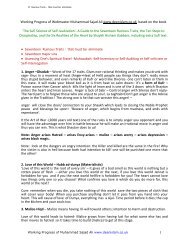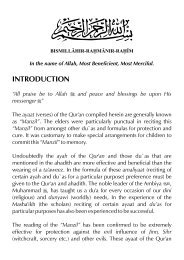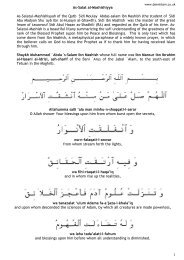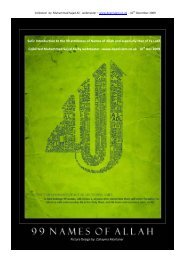Sufi Introduction to the 99 Names of Allah and sufi ... - Deen islam
Sufi Introduction to the 99 Names of Allah and sufi ... - Deen islam
Sufi Introduction to the 99 Names of Allah and sufi ... - Deen islam
Create successful ePaper yourself
Turn your PDF publications into a flip-book with our unique Google optimized e-Paper software.
Collected by Muhammad Sajad Ali - webmaster – www.deen<strong>islam</strong>.co.uk - 10 th December 2009<br />
The One whose unity includes all that appears as diverse, separate or individual.<br />
From <strong>the</strong> root w-h-d which has <strong>the</strong> following classical Arabic connotations:<br />
<strong>to</strong> be one, <strong>to</strong> be made one, <strong>to</strong> be called one<br />
<strong>to</strong> connect, join, unite<br />
<strong>to</strong> be unique, singular<br />
<strong>to</strong> be one apart from o<strong>the</strong>rs<br />
This name is used in <strong>the</strong> Qur'ân. For example, see 39:4<br />
The ancient roots <strong>of</strong> Ahad point <strong>to</strong>ward <strong>to</strong> <strong>the</strong> essential qualities which describe Unity, while <strong>the</strong><br />
ancient roots <strong>of</strong> Wâhid point <strong>to</strong>ward <strong>the</strong> manifestations which arise from that Unity.<br />
That which is Ahad cannot be divided in<strong>to</strong> parts, or any parts distinguished. That which is Wâhid has<br />
<strong>the</strong> appearance <strong>of</strong> being divisible in<strong>to</strong> separate parts, or being comprised <strong>of</strong> separate parts.<br />
Ahad is used <strong>to</strong> refer <strong>to</strong> <strong>the</strong> One, <strong>the</strong> sole One, <strong>the</strong> One who was not begotten <strong>and</strong> who has ever<br />
been alone, <strong>the</strong> One who has no second, <strong>the</strong> Indivisible.<br />
Wâhid indicates <strong>the</strong> solitary Starting Point, <strong>the</strong> One Source, <strong>the</strong> First <strong>of</strong> <strong>the</strong> Many, from which all <strong>of</strong><br />
creation has arisen as manifestations <strong>of</strong> Unity. From a human point <strong>of</strong> view, <strong>the</strong> manifestations may<br />
appear separate <strong>and</strong> diverse, but in reality <strong>the</strong>y are One.<br />
(Also written as al-wahid, al-waahid, <strong>the</strong> One: ya wahid, ya waahid)<br />
67. Al-Ahad - The One <strong>and</strong> Only, Unique, The Unity<br />
The One who has ever been <strong>and</strong> ever remains alone. The incomparable, unequalled, indivisible<br />
One. The One who is <strong>the</strong> essence <strong>of</strong> Unity. The Sole One. The One <strong>and</strong> Only One.<br />
YA AHADU: O One! Certain mysteries are revealed <strong>to</strong> those who invoke this Name 1,000 times.<br />
The One who has no second [that shares] in <strong>the</strong> lordship, nor in <strong>the</strong> essence, nor in <strong>the</strong> attributes.<br />
The One who was not begotten <strong>and</strong> has never begotten.<br />
The One who depends upon no o<strong>the</strong>r, <strong>and</strong> <strong>to</strong> Whom <strong>the</strong>re is no likeness. The One in whom all<br />
names, attributes <strong>and</strong> relationships are united.<br />
From <strong>the</strong> root a-h-d which has <strong>the</strong> following classical Arabic connotations:<br />
<strong>to</strong> be one<br />
<strong>to</strong> be <strong>the</strong> only one, one alone, sole<br />
<strong>to</strong> unite, unify<br />
This name is used in <strong>the</strong> Qur'ân. For example, see 112:1<br />
The ancient roots <strong>of</strong> Ahad point <strong>to</strong>ward <strong>to</strong> <strong>the</strong> essential qualities which describe Unity, while <strong>the</strong><br />
ancient roots <strong>of</strong> Wâhid point <strong>to</strong>ward <strong>the</strong> manifestations which arise from that Unity.<br />
That which is Ahad cannot be divided in<strong>to</strong> parts, or any parts distinguished. That which is Wâhid has<br />
<strong>the</strong> appearance <strong>of</strong> being divisible in<strong>to</strong> separate parts, or being comprised <strong>of</strong> separate parts.<br />
66







